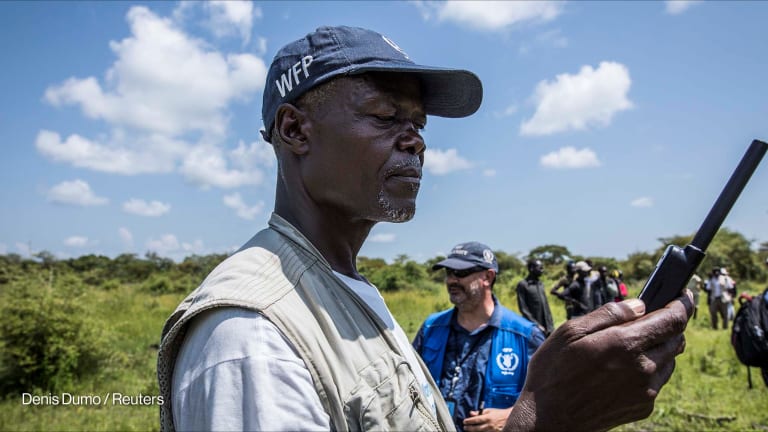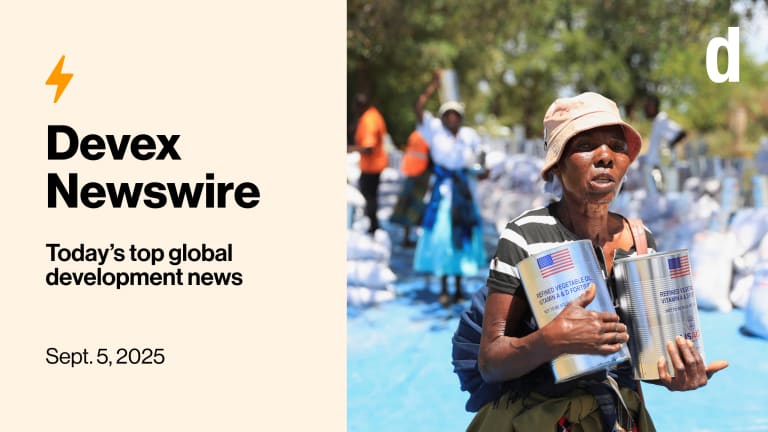
Norway and Sweden have scaled back plans to use foreign aid to cover the cost of hosting Ukrainian refugees at home. However, advocates say more needs to be done to address the global food crisis and preserve the integrity of aid.
The two countries, which are among the world’s largest and most generous aid donors, triggered outrage at home and abroad earlier this year when they announced plans to shift funds intended for Africa, NGOs, and United Nations agencies to domestic refugee costs. That’s allowed under aid accounting rules, though the head of the OECD’s Development Assistance Committee warned in April that funds mobilized in response to the Ukraine war should be additional to existing commitments elsewhere.
Sweden had first announced plans to use 10.3 billion Swedish kronor ($1 billion) from its 57.4 billion kronor foreign aid budget to cover hosting costs — up from 1.2 billion kronor earmarked for the purpose before the Ukraine war. However, earlier this month the government said in a press release that it would put 1.3 billion kronor back into NGOs working on human rights and democracy abroad, due to more modest predictions from migration authorities over the expected number of refugees from Ukraine.
“One day of income from oil and gas could have covered up for the 1,5 BN NOK cut we ended up with in the end.”
— Henriette K. Westhrin, secretary-general, Norwegian People’s AidThe government argued that with ongoing uncertainty about how many Ukrainians would need protection in Sweden, it needed to maintain room for maneuver by continuing to hold back the rest of the funds until the next official estimate from the migration authority later in the year.
Åsa Thomasson, policy and advocacy coordinator at the NGO alliance CONCORD Sweden, told Devex that the decision to return just 1.3 billion kronor to aid abroad seemed “random” and too little “given that there is a global hunger crisis.”
In Norway, the government’s initial budget revision after the Ukraine war began would have seen 4 billion Norwegian kroner ($409.7 million) shifted to hosting refugees at home. But, after negotiations with the Socialist Left, some 1.5 billion kroner was reallocated instead.
“It’s not like we’re drinking champagne,” Ingrid Fiskaa, the Socialist Left’s foreign affairs spokesperson told Devex. “We’re not of course thrilled there will still be a cut but we think we’ve managed to save a lot and it means a lot to [civil society organizations] and the U.N. … not to mention the people this is really about. So it’s acceptable is what I would call it.”
The changes meant that the U.N. Development Programme recouped 390 million kroner of an initially planned 440 million krone cut. UNICEF recovered 307.5 million kroner of a potential 357.45 million krone cut.
“Norway has always been an engaged player in the international field, and we expect them to continue to be that,” Ulrika Modéer, U.N. assistant secretary-general and director of the Bureau of External Relations and Advocacy at UNDP, told Devex by email. “We look forward to our partnership with Norway growing in step with the needs of the most vulnerable worldwide.”
Norwegian People’s Aid’s secretary-general, Henriette K. Westhrin, told Devex by email of her “relief” at the cuts being largely reversed, adding the hope “that the government now realises that there is not a majority in parliament to use the aid budget as a tool to regulate the pressure in the Norwegian economy.”
“Norway is benefiting enormously from the war in Ukraine, and we must remember that our increased income is at other people’s expense,” Westhrin wrote. “Only one day of income from oil and gas could have covered up for the 1,5 BN NOK cut we ended up with in the end.”
Westhrin wrote that her organization was also concerned that a similar scenario would play out during the next budgetary discussions in October, adding that it is “high time to change the practise of financing in country refugee costs with [official development assistance].”
Carl Björkman, the head of Nordics at the Bill & Melinda Gates Foundation, told Devex in an email that Norway needed to avoid a “stop-go funding approach, promising resources to UNICEF, UNWomen or UNAIDS and then slashing it without forewarning.”
“Looking ahead to the 2023 and 2024 budget, it will be important to ‘correct’ the reductions made this year, and the way to do so is to fully reinstate or compensate for the 2022 cuts,” Björkman wrote. “Failing to compensate for the cuts this year would set a dangerous precedent.”
Search for articles
Most Read
- 1
- 2
- 3
- 4
- 5








